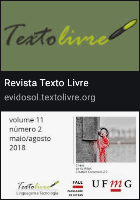
Texto Livre-Linguagem e Tecnologia
Scope & Guideline
Bridging Language and Technology for a Connected Future.
Introduction
Aims and Scopes
- Digital Literacy and Education:
The journal emphasizes the role of digital literacy in education, exploring how technology can enhance learning experiences and outcomes across various educational contexts. - Technological Integration in Language Learning:
It investigates how different technological tools and methodologies can be effectively integrated into language teaching and learning, facilitating better engagement and comprehension. - Pedagogical Innovations:
The focus is on innovative pedagogical approaches that leverage technology to improve educational practices, including the use of gamification, virtual learning environments, and interactive media. - Multimodality and Communication:
Research in this area examines the use of multimodal texts and communication strategies, reflecting on how various modes of communication (visual, auditory, textual) interact in educational settings. - Social and Cultural Implications of Technology:
The journal also addresses the social and cultural implications of technology in education, including issues of equity, access, and the role of technology in shaping identities and communities.
Trending and Emerging
- Algorithmic Literacy and AI in Education:
There is a growing focus on algorithmic literacy, particularly the implications of AI technologies like ChatGPT on educational practices and student learning. - Use of Digital Tools for Emotional and Social Learning:
Research increasingly explores the impact of digital tools on emotional and social learning, particularly in early childhood education and inclusive settings. - Integration of Multimodal and Transmedia Approaches:
Emerging studies highlight the integration of multimodal and transmedia approaches in education, reflecting a shift towards using diverse media formats to enhance learning. - Critical Pedagogy and Digital Citizenship:
There is a rising interest in critical pedagogy and the role of digital citizenship, emphasizing the need for educators to prepare students for ethical engagement in digital spaces. - Research on Digital Inclusion and Accessibility:
Recent themes have focused on digital inclusion and the barriers faced by marginalized groups, addressing the need for equitable access to educational technologies.
Declining or Waning
- Traditional Literacy Practices:
There is a noticeable decrease in research focused solely on traditional literacy practices without the integration of technology, as the emphasis shifts towards digital competencies. - Static Educational Models:
Research that promotes static or traditional educational models is less frequent, indicating a move towards dynamic, technology-enhanced, and student-centered learning approaches. - Narrow Focus on Local Contexts:
Themes that concentrate exclusively on local educational contexts without considering global or comparative perspectives have been waning, as researchers seek broader applicability of their findings. - Limited Scope of Language Pedagogy:
The exploration of language pedagogy in isolation from technological influences is becoming less common, as the journal increasingly prioritizes the interplay between language and digital tools.
Similar Journals

Journal of E-Learning and Knowledge Society
Navigating the Evolving Landscape of Digital EducationJournal of E-Learning and Knowledge Society is a premier academic journal dedicated to the exploration and advancement of e-learning and knowledge dissemination in contemporary society. Published by the SOC ITALIANA E-LEARNING, this journal has established itself as a vital resource for researchers and practitioners since its inception in 2006. With an open access model adopted in 2007, the journal promotes the free exchange of ideas and research findings, ensuring wide accessibility to academic contributions in this rapidly evolving field. The journal is indexed in notable databases and holds a Q3 classification in both Computer Science Applications and Education, reflecting its significant role in the advancement of educational technologies. Furthermore, its Scopus ranks highlight its relevance within the educational and computer science communities. Based in Rome, Italy, the Journal of E-Learning and Knowledge Society aims to bridge the gap between theory and practice, providing a platform for innovative research that shapes the future of digital learning environments. Whether you are a researcher, educator, or student, this journal offers valuable insights and developments in e-learning that are critical to navigating today’s knowledge society.
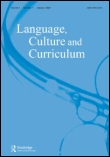
Language Culture and Curriculum
Innovating Language Teaching Across Diverse CulturesLanguage Culture and Curriculum is a premier academic journal published by Routledge Journals, Taylor & Francis Ltd, dedicated to advancing knowledge in the fields of Education and Linguistics. With a distinguished history since 1988 and converging through to 2024, this journal is highly regarded, reflecting its exemplary standing with a 2023 Q1 ranking in both Education and Linguistics. Currently among the top 3% of publications in Language and Linguistics and ranked 27th in Social Sciences, Language Culture and Curriculum fosters the exploration of language education within diverse cultural contexts. Through rigorous peer-reviewed research, it serves as an essential platform for researchers, educators, and policymakers alike, promoting innovative practices and theoretical frameworks in language teaching and curriculum development. Although it does not offer Open Access, the journal remains an invaluable resource in academic circles, supporting scholarly discourse and advancing educational methodologies.
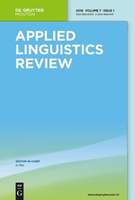
Applied Linguistics Review
Championing high-quality research in language acquisition.Applied Linguistics Review is a leading academic journal published by WALTER DE GRUYTER GMBH, focusing on the dynamic field of linguistics and language studies. With an impressive Q1 quartile ranking in both Linguistics and Language and Social Sciences, the journal positions itself at the forefront of research, making it a crucial resource for scholars and professionals alike. The journal aims to foster scholarly dialogue by publishing high-quality, peer-reviewed articles that explore theoretical frameworks, empirical studies, and innovative methodologies in applied linguistics. Operating from Poland with an international reach, it is committed to advancing knowledge in areas such as language acquisition, language policy, and multilingualism. Its notable performance can be seen in its Scopus rankings, where it stands at #72 out of 1088 in the Arts and Humanities category and #86 out of 1167 in Social Sciences. The Applied Linguistics Review serves as an invaluable platform for researchers, educators, and students to disseminate and engage with cutting-edge research, thereby enhancing their understanding and application of linguistic principles in diverse contexts.
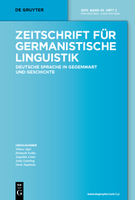
ZEITSCHRIFT FUR GERMANISTISCHE LINGUISTIK
Connecting Theory and Practice in LinguisticsZEITSCHRIFT FUR GERMANISTISCHE LINGUISTIK, published by WALTER DE GRUYTER GMBH, stands as a pivotal resource in the field of linguistics since its inception in 1973. With its ISSN 0301-3294 and E-ISSN 1613-0626, this esteemed journal serves as an essential platform for researchers and academics focused on the nuances of the German language and its linguistic frameworks. Catering to a diverse audience, the journal features high-impact articles and contributions consistent with rigorous academic standards, as evident from its Q1 categorization in Linguistics and Language and its notable rankings in both the Arts and Humanities and Social Sciences domains. The journal's commitment to advancing knowledge in linguistics fosters a scholarly environment conducive to both emerging and established linguists. While not available through open access, ZEITSCHRIFT FUR GERMANISTISCHE LINGUISTIK remains influential, drawing readers keen on exploring developmental and educational paradigms alongside linguistic theories. With a convergence of research that spans until 2024, it represents a comprehensive body of work integral to the evolving landscape of linguistic studies in Germany and beyond.
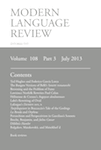
MODERN LANGUAGE REVIEW
Connecting Scholars Through Innovative Language ResearchMODERN LANGUAGE REVIEW, published by the Modern Humanities Research Association, is a pivotal academic journal based in the United Kingdom, focusing on the fields of linguistics, literature, and literary theory. With an ISSN of 0026-7937 and an E-ISSN of 2222-4319, this journal serves as a platform for disseminating research that explores the nuances of language and its literary contexts. Although currently not an open-access publication, it provides valuable insight into a range of topics, contributing to a deeper understanding of human communication and expression. Covering a wide scope with a publication history from 2002 to 2024, the journal is indexed in Scopus and holds a Q4 ranking in both linguistics and literature categories, indicating its emerging influence within these academic disciplines. As the landscape of humanities research continues to evolve, MODERN LANGUAGE REVIEW remains a vital resource for scholars, professionals, and students aiming to engage with contemporary debates and developments in language and literature.
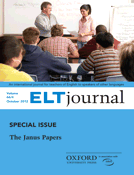
ELT Journal
Transforming Pedagogy through Insightful ScholarshipELT Journal, published by Oxford University Press, is a premier academic journal dedicated to the fields of Educational Psychology, Linguistics, and Language, boasting an esteemed Q1 category ranking across these disciplines. Since its inception in 1946, the journal has served as a vital platform for researchers and educators, offering insights into English Language Teaching (ELT) and the evolving pedagogical practices that influence language acquisition and literacy development. With an impressive Scopus ranking placing it in the 95th percentile within the Arts and Humanities (Linguistics and Language), ELT Journal not only contributes to academic discourse but also bridges theoretical frameworks with practical applications in educational settings. Although it does not currently offer Open Access, the journal remains essential for professionals and students alike, eager to stay abreast of the latest research trends and innovations in the global ELT landscape. For those committed to advancing their understanding of language education, the journal's diverse range of articles and case studies provide invaluable resources.
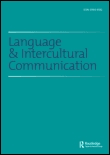
Language and Intercultural Communication
Transforming Communication Through Cultural AwarenessLanguage and Intercultural Communication is a leading peer-reviewed journal published by Routledge Journals, Taylor & Francis Ltd, based in the United Kingdom. With an ISSN of 1470-8477 and an E-ISSN of 1747-759X, this esteemed publication has established itself as a vital resource in the fields of Communication and Linguistics, boasting an impressive Q1 classification in both categories as of 2023. The journal's scope encompasses a broad range of topics related to language and its role in intercultural contexts, making it an essential platform for researchers, professionals, and students alike who wish to contribute to and learn from the latest scholarly discussions. Even without an open-access option, its high impact factor and strong Scopus rankings, which place it in the 87th percentile for Linguistics and Language, affirm its significance in shaping contemporary dialogue. As we move towards 2024, Language and Intercultural Communication continues to foster academic exchanges that challenge, expand, and enrich understanding across diverse linguistic and cultural landscapes, making it a must-read for anyone interested in the intersection of language and culture.

ALSIC-Apprentissage des Langues et Systems d Information et de Communication
Connecting Scholars to Enhance Language Education Worldwide.ALSIC-Apprentissage des Langues et Systems d Information et de Communication, published by ADALSIC, is a premier Open Access journal that has been at the forefront of language learning and information and communication systems since its inception in 1998. With its ISSN 1286-4986, this journal provides a crucial platform for researchers, educators, and practitioners to share innovative findings and pedagogical practices in the interdisciplinary fields of linguistics, education, and technology. The journal invites contributions that explore the dynamics of language acquisition, the effectiveness of communication systems, and the integration of technology in learning processes. By maintaining an Open Access policy, ALSIC ensures that its valuable research is accessible to a global audience, promoting collaboration and knowledge sharing among scholars and professionals dedicated to enhancing language education and communication methodologies. As an inclusive journal based in Strasbourg, France, it plays a vital role in shaping current discourse and advancing research in its field.
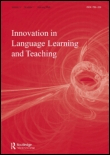
Innovation in Language Learning and Teaching
Empowering Educators with Cutting-Edge Language Research.Innovation in Language Learning and Teaching is a premier peer-reviewed journal published by Routledge Journals, Taylor & Francis Ltd, focusing on the intersection of innovative practices in language education and teaching methodologies. With a notable impact factor reflected in its recent placement in the Q1 quartile for both Education and Linguistics and Language categories, this journal serves as a crucial resource for scholars and practitioners aiming to enhance pedagogical approaches and improve learning outcomes in language education. Spanning from 2009 to 2024, it showcases cutting-edge research that addresses contemporary challenges in the field, facilitating a deeper understanding of language acquisition, pedagogy, and curriculum development. The journal is indexed in Scopus, demonstrating its significant contribution to the academic community, with impressive ranks in both the Arts and Humanities as well as the Social Sciences categories. Although it follows a traditional subscription model, the journal is committed to disseminating high-quality research that fosters collaboration and discussion among researchers, educators, and students dedicated to advancing language learning and teaching practices.
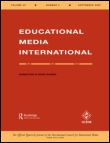
Educational Media International
Connecting theory and practice in educational media.Educational Media International, published by Routledge Journals, Taylor & Francis Ltd, is a premier journal in the interdisciplinary fields of Communication and Education, with a commendable Q2 ranking in both categories as of 2023. Established in 1978, this journal serves as a significant platform for the dissemination of innovative research that explores the evolving intersection of media technologies and educational practices. With an emphasis on both theoretical and practical applications, it addresses crucial topics such as digital learning environments, multimedia educational resources, and the impact of social media on education, making it an essential resource for researchers, professionals, and students alike. Located in the United Kingdom, Educational Media International not only contributes to the academic discourse but also reflects global trends and challenges in education, fostering a deeper understanding of the vital role media plays in shaping learning experiences worldwide.